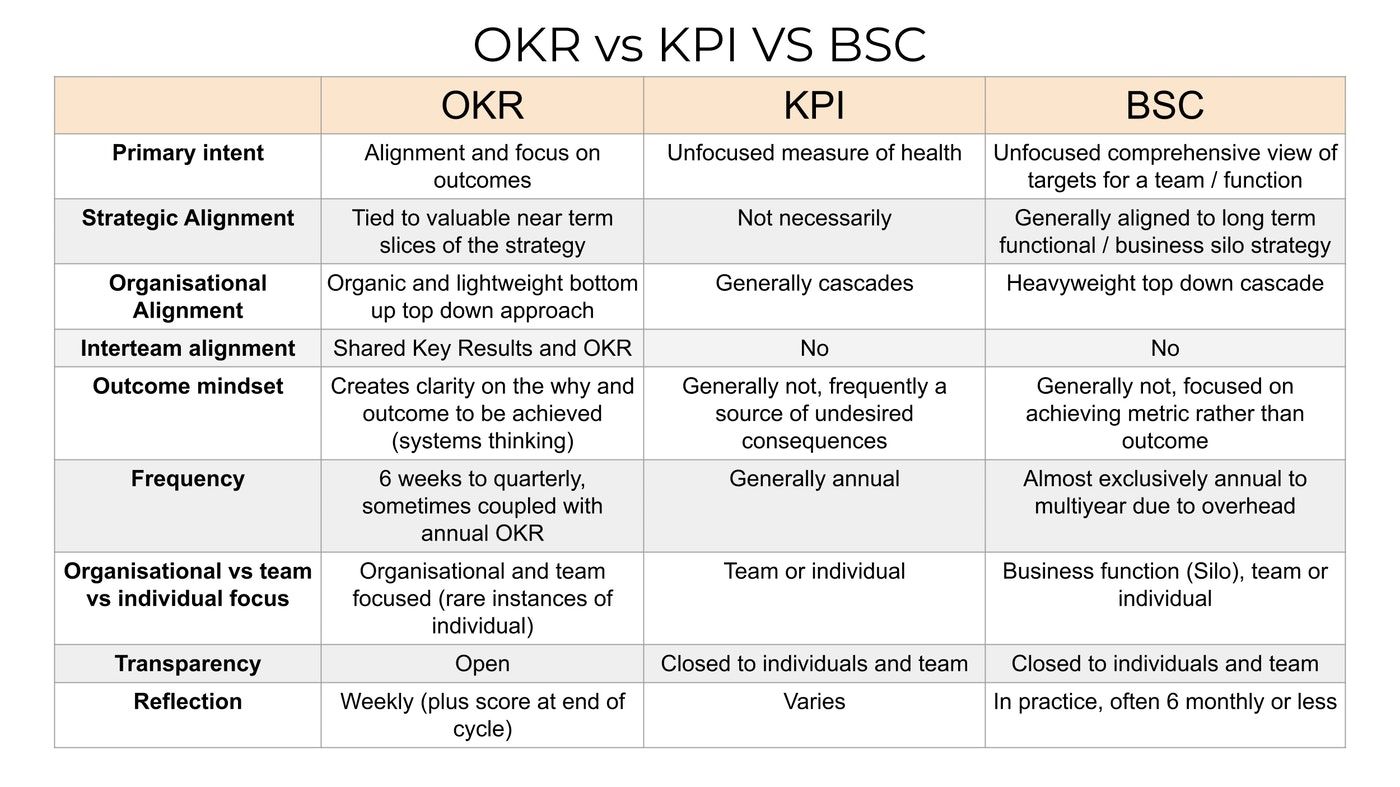OKR vs KPI vs Balanced Score Card
Understanding OKRs, KPIs, and the Balanced Scorecard
Today, we're diving into the core differences and functionalities of Objectives and Key Results (OKRs), Key Performance Indicators (KPIs), and the Balanced Scorecard. Each of these tools serves distinct, yet occasionally overlapping roles in business management, focusing on various aspects of organizational health and strategic alignment. This guide unpacks each component to clarify their purposes and best uses.
Key Performance Indicators (KPIs)
KPIs are metrics used to reflect the operational success and health of a business. They are crucial for monitoring the ongoing state of various critical functions within an organization.
Purpose: Maintain a healthy business environment.
Usage: Monitor essential metrics such as cash flow, customer satisfaction scores, and first call resolution rates.
Example: If a call center's KPI for first call resolution remains within the target green zone, it suggests that customers' problems are being effectively resolved on the first call, indicating healthy operational performance.
Objectives and Key Results (OKRs)
OKRs are all about change. They are strategic tools used to set specific objectives and track outcomes via key results, driving alignment and focus throughout the organization.
Purpose: Drive change and foster alignment and focus within the organization.
Usage: Set challenging goals with specific outcomes that encourage teams to stretch their capabilities.
Example: For a new product, establishing an OKR to have users engage with the product three times a week, setting a clear target even without a historical baseline.
Balanced Scorecard
The Balanced Scorecard provides a holistic view of an organization's performance by incorporating various performance metrics across multiple perspectives.
Purpose: Provide a broad, balanced view of organizational performance.
Usage: Track long-term strategic measures across financial, customer, internal processes, and learning and growth perspectives.
Example: A regular review of the scorecard might show if the organization is on the right path towards strategic goals across all functions.
Key Differences and How They Integrate
While KPIs, OKRs, and the Balanced Scorecard can coexist in an organizational strategy, they serve different needs and should not be confused with one another.
Integration in Business Management:
KPIs ensure the business runs smoothly on a day-to-day basis by monitoring health metrics.
OKRs drive strategic change by focusing on ambitious, actionable goals that progress quarterly or bi-annually.
Balanced Scorecard looks at the long-term strategic health of the organization and is comprehensive, integrating numerous metrics across various business areas.
Practical Application:
KPIs Turn Into OKRs: Sometimes a KPI may become an OKR if there's a need for significant improvement or change (e.g., drastically improving first call resolution when metrics fall into the red zone).
Balanced Scorecard and OKRs: While the Balanced Scorecard gives a long-term strategic view, OKRs can be considered as actionable steps derived from this broader strategy, focusing on immediate priorities.
Challenges and Considerations
Maintaining Focus: It’s crucial not to let the broad scope of the Balanced Scorecard dilute the focused nature of OKRs.
Measuring Success: The Balanced Scorecard measures long-term success, while OKRs allow for more frequent adjustments based on short-term outcomes.
Integration: Carefully align OKRs with the strategic aims outlined in the Balanced Scorecard to ensure cohesive progress towards overarching goals.
Conclusion
Understanding the distinct roles and integration of KPIs, OKRs, and the Balanced Scorecard is essential for effective strategic management. By aligning these tools thoughtfully, organizations can ensure day-to-day health, strategic focus, alignment, and long-term vision are all addressed, driving comprehensive success across all levels of operation.
OKR vs KPI vs Balanced Score Card

We would like to hear your thoughts!
At OKR Quickstart, we're continuously working to improve our materials. We would like to hear your thoughts on how we can do better by leaving a response in the form below: